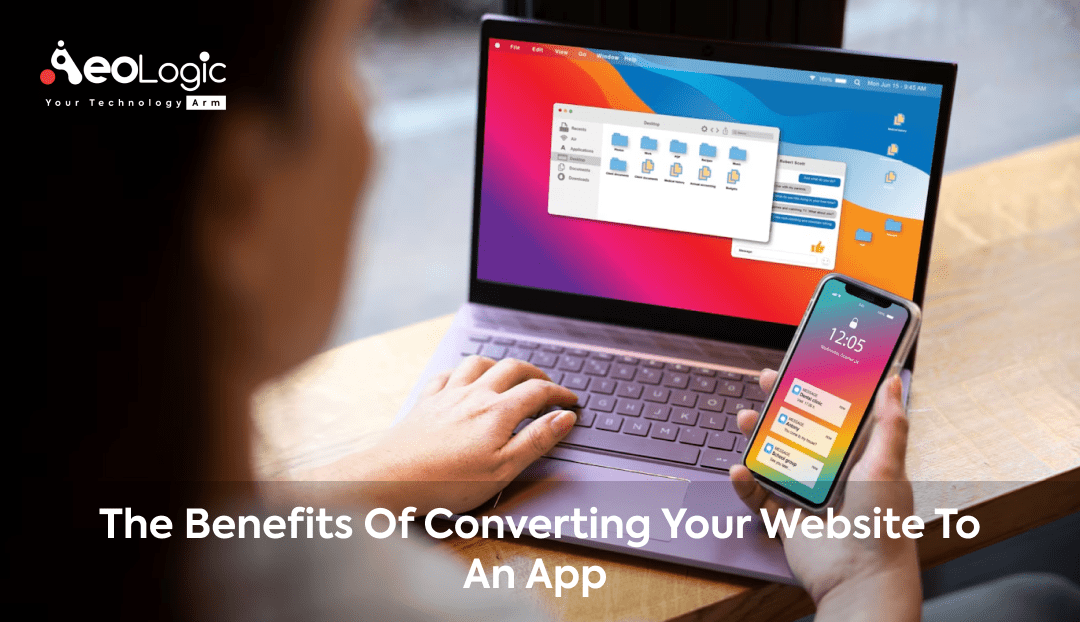It is no secret that our society is getting highly reliant on mobile device. But having a mobile optimized website alone is no longer enough to thrive in today’s fleetly evolving digital geography, particularly when targeting mobile users. A mobile website is just nothing, however, only the bare minimum. To keep pace with consumer prospects and gain an edge over your competition, converting your website into an app is critical. The figures speak for the benefits of converting website to app. 88 percent of mobile device time is spent using apps. 70 percent of all digital media consumption comes from apps, and mobile apps are anticipated to induce over $ 935 billion this time alone. In this composition, we are going to explore the benefits of converting website to app. Read on the composition.
Converting a website into an app opens up in numerous openings for businesses across every assiduity. From perfecting user engagement and client loyalty to penetrating new profit stream and expanding market reach, these benefits are hard to overlook for anyone with a website. Fortunately, developing an app has no way been easier.
With the assistance of a website or an app builder, you can switch your website into your own app rapidly— without breaking the bank. Nonetheless, the information in this composition might be enough to change your mind, if you are still on the fence. We will dive deep into all the benefits and advantages of going from a website to a mobile app that will take your business to new heights.
Also read: Importance of Mobile App Testing for Your Applications
Benefits of Converting Website to App
Enhancing the Mobile User Experience
A whopping 85 percent of consumers say they prefer mobile apps over mobile websites. So when you convert your website to an app, you are immediately enhancing the user experience.
How is this possible? Let’s take a look at some crucial UX- related advantages of a mobile app compared to a website.
User Interface and Interaction
Apps are designed with mobile users in mind, providing interfaces and relations that are optimized for small displays and touch controls. This results in significant advancements in user interface (UI) design, including simplified menus, larger buttons, and intuitive gestures that enhance the overall user experience. Apps have a clear edge over mobile websites that frequently bear pinching, zooming, and scrolling to view content.
Speed and Performance
One of the most noticeable differences users experience when switching from a website to an app is speed. Apps store data locally on the device, allowing for quicker loading times and smoother transitions between features and content. This immediate access is pivotal for retaining users, as loading delays can lead to frustration and abandonment.
Navigation and Availability
Apps also provide greater and better navigation compared to mobile websites. With the capability to apply custom navigation results, for instance, as bottom most navigation bars or swipeable tabs, apps make it easier for users to find what they are looking for. This encourages deeper disquisition of what the app has to offer.
Also read: The Importance of Mobile Apps in Real Estate Industry
Engagement and Satisfaction
The acclimatized UX that apps give leads to advanced engagement situations and client satisfaction. Features like drive announcements can be used to keep users informed and engaged. Thus, offering timely updates and substantiated content that draws them back into the app. This direct line of communication that websites struggle to match. Making apps an important tool for fostering long term connections with users.
Penetrating Native Mobile Features
One of the most compelling benefits of converting website to app is the capability to pierce and use native mobile features. These features, natural to mobile bias, open up a new realm of possibilities for user commerce, engagement, and functionality that simply can not be matched by mobile websites. Exemplifications include:
- GPS-Enables position enabled services, furnishing users with acclimatized content, near store locales, or substantiated offers grounded on their current position.
- Camera-Allows for interactive features like surveying QR codes, uploading images directly from the device, or indeed augmented reality experiences, perfecting user
- Push Notifications- Offer a direct channel to keep users informed and engaged, whether it’s about new content, elevations, or updates, encouraging frequent app operation.
- Accelerometer-Can be used in fitness apps to track physical exertion, or in gaming apps for motion driven controls, adding a subcaste of interactivity and fun.
- Contact List-Facilitates features like easy sharing, social relations, or transferring invites directly from the app, promoting a sense of community and connectivity.
- Biometric Authentication-For example, point or facial recognition, offers a secure and accessible way for users to pierce their accounts, enhancing both security and user
Implementing these features into your native app not only helps in enhancing its appearance and usability. However, it also provides practical advantages that can considerably impact user retention and satisfaction. For case, an e-commerce app exercising drive alerts for substantiated offers can see an increase in recall visits and sales. Also, a travel app using GPS for real time updates and position grounded services can come as an necessary tool for travelers.
Streamlining Business Processes
Mobile apps offer a significant advantage in streamlining business operations, leading to enhanced effectiveness and productivity. By integrating different business processes into a single app, companies can automate tasks, ameliorate communication, and manage data more effectively.
This connection not only simplifies operations but also reduces the time and resources. That is needed to manage them, directly impacting the bottom line by reducing functional costs. For illustration, apps can allow easier order processing, real time supply operation, and instant client support. Hence, furnishing a flawless experience for both the business and its clients.
Also read: Benefits of Mobile Responsive Designs for E-commerce Business
Converting Website to App- Is It Worth It?
The decision to convert your website into an app is easily worth it. The benefits — ranging from enhanced user engagement and loyalty to new profit openings and streamlined business operations. All punctuate the strategic value of embracing mobile app technology.
For businesses, ready to make this transformative leap, Aeologic Technologies stands out as the ideal partner. With our cutting edge services delivery, the transition from website to app has no way been easier. Our industry experts will help you to design your existing website, automatically pulling in brand information, content, and logos. This integration significantly accelerates the app development process, assuring that your mobile app aligns perfectly with your brand identity.







